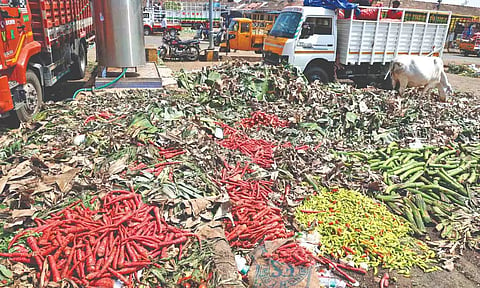

CHENNAI: Rani, a flower vendor and a resident of Wimco Nagar travels to Koyambedu wholesale market through bus route 159 A from Tiruvottriyur depot to buy over 10-15 kg of flowers which would be cheaper compared to the products sold at flower bazaar.
After the inauguration of the Kalaignar Centenary Bus Terminal in Kilambakkam, travel expenses of autos have increased and the frequency of MTC buses decreased in north Chennai. Now, Rani is forced to buy the same flowers at George Town and Madhavaram for Rs 500-600.
The usual hustle-bustle at the market was missing, and the place looks desolate, after the CMBT bus stand was shifted to KCBT. Traders lamented over the loss of sales which have decreased by 25% in the last two weeks. Most consumers travelling to other districts would take the early morning buses, and that’s when the sales would peak. After the bus stand was shifted to Kilambakkam, the volume of unsold perishable commodities kept increasing, and were eventually thrown out.
After the KCBT’s inauguration in December last year, inter-district buses were asked to operate from Kilambakkam, which drew wide-spread criticism from the public and traders. Passengers had to spend a lot of money on tickets to reach the terminus to board buses to other districts. The situation not only affected the public but also adversely impacted the businesses of traders at Koyambedu wholesale market.
Wasted flowers, veggies
Perishable commodities come from Karnataka, Andhra Pradesh, Maharashtra and Tamil Nadu to the Koyambedu market. Because of low sales, traders end up dumping them as they have no facilities to store them for the next day.
“We’ve experienced a drastic drop in sales in the last two weeks. At least 60-70% of the sale would happen in the early morning hours by retailers and the general public travelling to other districts of Tamil Nadu, as the prices are cheaper here compared to other markets in the city and their hometown. Now it’s dropped to 25%,” said P Sukumaran, secretary of the Koyambedu Wholesale Merchants’ Association.
S Mookandi, secretary of Koyambedu Flower Merchants Association, rued that the majority of the customers who travel to other districts especially Tiruvallur, Chengalpattu and Kancheepuram districts would buy flowers from CMBT. “Since there are no buses to inter-districts, we’re forced to sell roses, marigolds (saamandhi) and tuberoses (sampangi) at Rs 10 per kg each,” he added.
When flowers do not get sold till the end of the day even though prices have decreased drastically, traders are forced to dump them. “At least 20 tonnes of flowers have been wasted daily in the last two weeks. Passengers choose to purchase from the nearest market even though it’s pricey, as they’re forced to spend on travel the buses were shifted to Kilambakkam,” pointed out Mookandi.
Similarly, other two markets are experiencing huge wastage where over 10 tonnes of vegetables and fruits are dumped every day. The loss hurts a lot more, as the market receives steady supply keeping the prices low. Thousands of traders are forced to sell flowers at a low cost. Many are seriously considering taking up another job but they’re also anxious about their lack of skills, as “selling fruits, vegetables and flowers is all we’ve been doing for more than two to three decades”.
As the prices of vegetables, fruits and flowers fluctuate every day, traders are forced to sell them at the lowest price. Vendors are unable to keep track of their daily profit. Dull sales affect the profit-making volume among traders.
Rental issues
The situation is much worse now in the market compared to the months during COVID-induced lockdown, as traders of three markets in Koyambedu are dependent on the inter-district buses going to and from Tamil Nadu for their sales.
Several wholesale traders had bought shops in Koyambedu market, and rented them out to retailers and other vendors. Due to the pandemic, out of 4,000+ shops in the market, around 300-400 have remained empty in the last 3 years.
With the KCBT becoming operational, more vendors and retailers have vacated the shops. This has hit wholesalers hard, as they were dependent on the rent they received from the market to balance out the loss they incurred in business.
Pointing out that the many buses under the SETC and TNSTC are not functional from CMBT, auto drivers charge double the rates for vendors reaching the market.
“We spend Rs 300 per trip from Egmore to Koyambedu, and when questioned, auto drivers claimed that they don’t have a return-passenger. So they compensate by increasing the price,” stated U Sarathi, a retail flower vendor in the city. “Why should we spend Rs 300 for an auto trip when we can buy flowers for the same price at Flower Bazaar and Madhavaram market?”
Traders at Koyambedu wholesale market have given petitions to the government to shift half the inter-district buses at CMBT. Only then would the sale increase marginally when compared to the last few days. “The government has to provide a solution for us. If not, it has to find an alternative arrangement that would ensure brisk sales,” opined a wholesaler at the market.